Ms Osempia is one of the longest serving staff members at Smith Secondary Campus. A teacher of biology, Osempia started working at the School in 2008 and is passionate about inspiring female students to pursue careers in science, technology, engineering and mathematic (STEM) fields.
“Tanzania needs professionals in these areas. Encouraging girls to work towards a career means they will be financially independent and eventually change their societies,” Osempia believes.
“Women are still not equal to men in some African communities. It is true that education is the most essential tool to aid women. It gives them strength and courage to stand out and let their voices be heard. As a teacher, I set this example.”
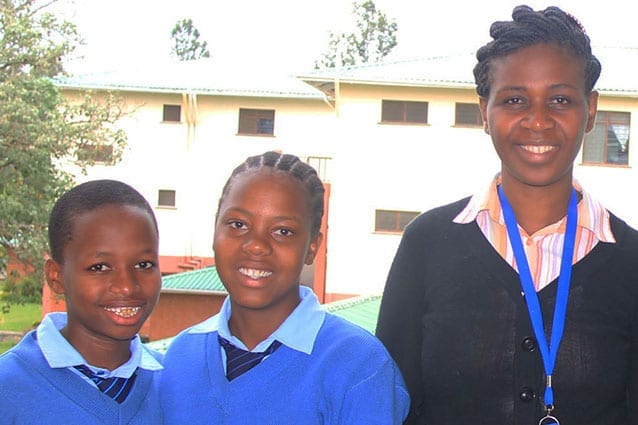
Osempia knows from personal experience that being educated is crucial in the fight against poverty.
“I was a government school student myself. I am from a very poor background. My father passed away when I started secondary school, so my mother had to take responsibilities supporting the family. This was not easy for her as a peasant who had to support two children. She encouraged me, being female, to study especially hard.”
Osempia’s persistence paid off. She graduated from Form 6 and went on to higher education to become a teacher. Now, she is a married mother of four boys aged between two and ten. She can afford to send her eldest sons to private schools because of the salary she receives at St Jude’s.
“Education broke the cycle of poverty for me. I am able to provide all basic needs for my family. My children will never know what it is like to live in a mud house as I did. Our home is made of bricks and we have good things.”
A day of teaching is not over when Osempia finishes in her science laboratory. When she goes home, Osempia encourages her boys to help with house chores and be good citizens.
“It is commonly assumed that a woman should only do house work and not be a professional. Though my sons are still young, I train them to help with housework and not to depend on me. This will help shape their ideologies so that when they have their own homes, they know how to respect a woman.”
Equally, Osempia takes her position as a role model for aspiring scientists very seriously. Many St Jude’s students will be among the first in their family to finish secondary education and pursue STEM careers.
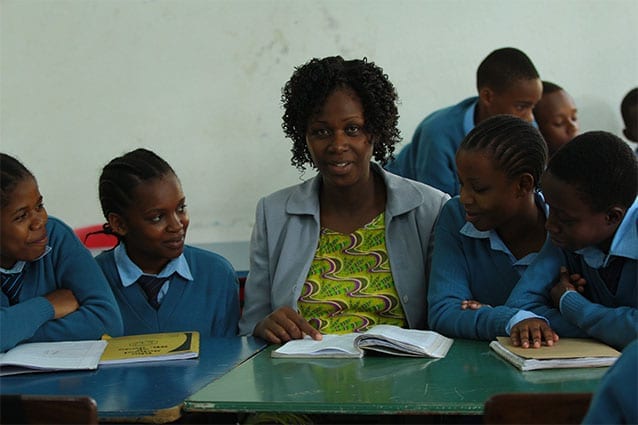
“Last year, the highest scoring St Jude’s students in Form 4 national examinations were girls. St Jude’s facilities and teaching staff help them realise they are equal to males. It is harder for girls in government schools. For example, St Jude’s girls are at less risk even travelling to and from school, because we provide free transport and boarding. It makes a big difference.”
“Our girls are succeeding and they have the opportunity to change the world. I feel proud to play a small part in their journey to success.”
Help staff like Osempia continue to support our students by making a donation to The School of St Jude.
Quotes translated from Swahili
St Jude’s students are renowned for their aptitude and potential to emerge as the future moral and intellectual leaders of Tanzania. The School provides a platform for students to step up, work hard and utilise their skills. However, for many students, their primary influence and motivation for success, is the wellbeing of family.
The parents and caregivers of our students are usually the people who miss a day’s work to bring them to St Jude’s on Student Selection and Uniform Days, with the belief that their child is uniquely deserving of an opportunity to thrive academically. They volunteer at St Jude’s for special occasions. Some become dedicated members of the Parents Committee. They are grateful that a stranger believes in their child’s potential so much, that they’d make it possible through ongoing, generous financial support.
Liberia is a single mother whose life has been changed through her daughter’s opportunity to attend St Jude’s.
Elizabeth, currently in Form 5, entered Standard 1 at the School in 2007. When Elizabeth’s father abandoned the family a year earlier, Liberia was left to support Elizabeth and her older brother, Martin, by making uji — a maize-based porridge — for a local nursery school. The family lived in a small, rented house made of mud and sticks.
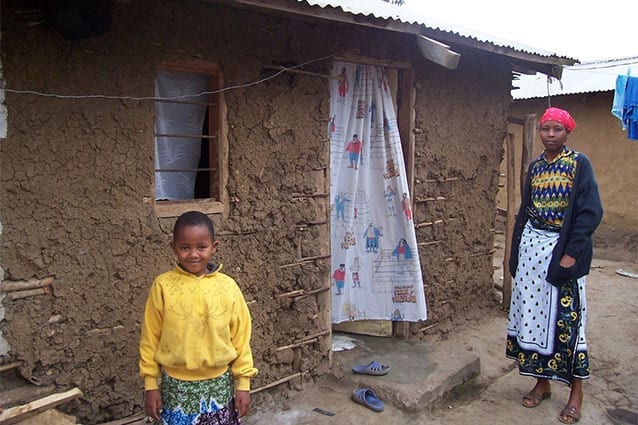
Alleviation of financial pressure thanks to Elizabeth’s academic scholarship at St Jude’s has meant that, a decade later, the family has gone from strength to strength.
“Our family has leapt to a better life. Elizabeth’s enrollment in St Jude’s meant I was able to save every penny that I earned for the last 11 years to buy a block of land, on which I have built a house for my children,” said Liberia, who now works as a cleaner in a government school.
Elizabeth’s new home is located approximately 10 kilometres from St Jude’s Sisia Primary Campus. To reach it, she must cross a fast-flowing creek and climb a steep hill. The house has no plumbing or electricity, but Liberia fills it with love and joy.
“I still remember how exciting it was when I took Elizabeth to [St Jude’s] testing day. I knew with Elizabeth’s grades in nursery school, that she would be successful. I was happy beyond measure when I found out she was accepted.”
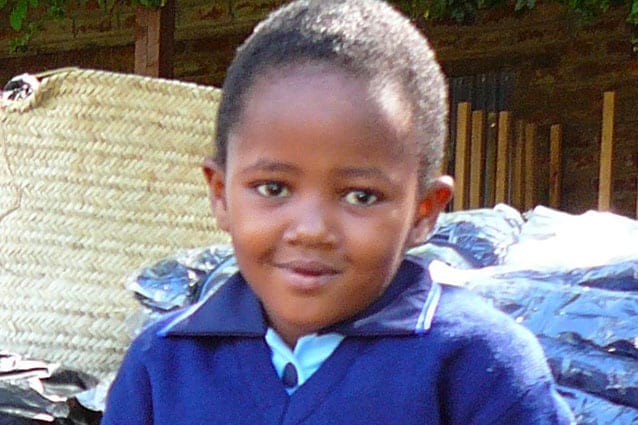
“If we had not received help from St Jude’s, our lives would have been so difficult. I would have incurred expensive costs to help Elizabeth achieve her dreams and I don’t think I would be financially able to sustain this family, or even get my children to go to school at all.”
Liberia’s infectious laugh and smiling eyes conceal the struggles of her past, as she looks towards her daughter’s bright future, made possible through the gift of a free, high quality education.
“St Jude’s makes it possible for Elizabeth to reach her long-term desire to be an educated woman, and above all, make her dreams come true. I don’t dream of being dependent on her. All I want for her is to succeed and live a better life. To hold on to opportunities which will be fruitful for her.”
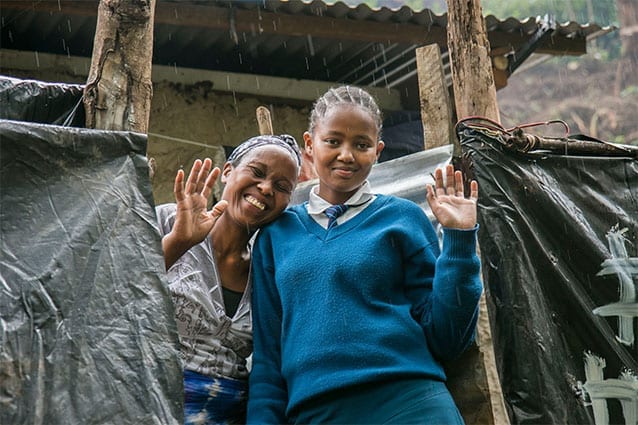
To girls and women around the world, Liberia offers poignant words of advice.
“Know your worth and understand that even though life can be tough, you must have power to make firm decisions. Do not be dependent to anyone in this world or surrender your worth to any man. A woman’s worth is immeasurable in this world. Take me for an example: as a mother, I refused to disown my children when my husband left. Have faith and never give up.”
When you sponsor an academic scholarship for one of our students, you create an opportunity for the entire family to prosper. Elizabeth’s education is currently half-sponsored.
Sponsor a student like her and see the ripple effect on an entire community.
The Conquerer - Yasintha, Form 5
Poverty, rejection, pain, worthless...
that's all I've been hearing about
The Woman
down the street.
She hushed her voice to listen to their provoking,
she tarnished her noise just to please their mocking.
She is a victim of pain, denial, trial,
all she ever knows is being exposed to
a world that's wild.
Why? Why? Why?
Why rip her heart from her chest and consume her?
Don't you know
when you insult a woman,
you insult the womb that carried you?
Who in the world told you
you can bite off the hand that feeds you? Fights for you?
They tell her breathing means she's alive...
...but breathing, for her, means she can
swallow air
long enough to survive.
But then, she rises above her pain, her sorrow,
brushes down her worry, getting herself in check,
always ready for tomorrow.
No way was she going to be stifled and
left to wither like a dying rose.
She cares for you, cries with you,
stands by you!
She is a mother, she is a wife, she is a fighter.
They call her 'Prey', they call her 'Nothing,
but I call her
'Beautiful', I call her 'Smart', I call her 'Caring', I call her 'Daring',
because she is special in every way.
She is a woman. She is The Conqueror.
Dozens of secondary students took to the stage on International Women’s Day to advocate for gender equality through speeches, song and dance. One Form 5’s reading of an original poem particularly unified the school community in reflection and celebration.
19-year-old Yasintha stood proudly behind the podium and briefly paused. Her eyes scanned the Smith Secondary Campus auditorium as she inhaled the energy of the crowd and began her stirring recitation.
“Poverty, rejection, pain, worthless… that’s all I’ve been hearing about the woman down the street…”
The Conqueror is an account of a fictional, unnamed woman’s disempowerment and her determination to overcome hardships. It sensitively highlights gender equality issues, while celebrating the strength and resilience of the protagonist.
“They call her ‘Prey’, they call her ‘Nothing’, but I call her ‘Beautiful’, I call her ‘Smart’, I call her ‘Caring’, I call her ‘Daring’, because she is special in every way. She is a woman. She is The Conqueror.”
Yasintha wrote the poem as a tribute to women worldwide who, unlike her, don’t have an opportunity to use their own voices to speak against injustice.
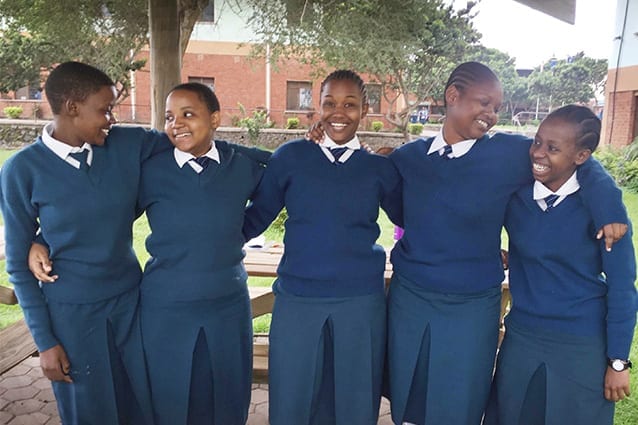
“It felt amazing to have the opportunity to speak [on International Women’s Day]. I was able to speak about the pain of other people who cannot yet speak for themselves. I was inspired to write The Conqueror for these girls and women. At St Jude’s, we are very lucky to be treated fairly. In some villages though, things are not always equal.”
According to US Aid, “less than 20 per cent of women aged 20-24 [in Tanzania] have completed secondary school and 20 per cent have no education at all.” At St Jude’s 51 per cent of the students are female. St Jude’s supporters are helping us close the education gap.
“The willingness to listen makes someone a powerful leader, in addition to speaking. When I finish school, I want to be a petroleum engineer and I will promote women’s rights so I can listen to people’s issues and help them use their voice. Given the chance, I would make sure everyone has courage to be seen as an equal,” Yasintha said. Who inspires this young, visionary leader?
“My mother and Maya Angelou [African-American poet]. My mother, because she has made me the woman I am today. And on International Women’s Day, we were told of a Maya Angelou quote which made me want to learn more: ‘I go forth alone, and stand as ten thousand.’ If I could meet her, I would congratulate her on what she did to help women.”
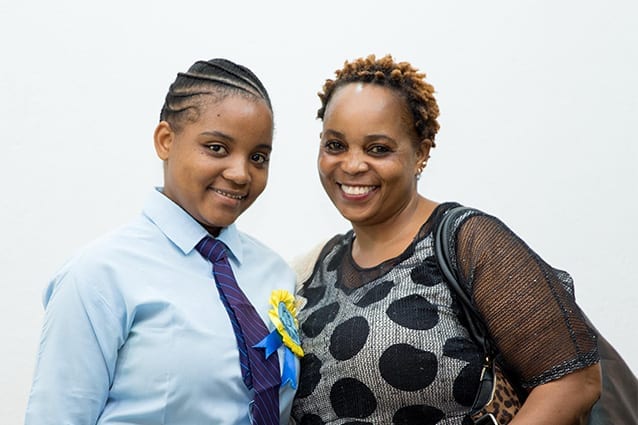
Yasintha benefits from receiving a high quality education at The School of St Jude. She is already one step ahead of many young women in Tanzania, and is empowered to be a leader in her community. Make a difference to the life of a future leader by sponsoring one of our students.
They say an apple a day keeps the doctor away, but at St Jude’s, we love hosting a brilliant team of health professionals each year who come to check on students’ wellbeing.
It’s no small task to adequately assess the needs of 1,800 students. Between them, our Health Check team has decades of experience in a range of fields, including (but not limited to) paediatrics, physiotherapy, nursing, audiology, optometry, psychology, education, counselling and general practice.
Doctor Philippa (Pip), a long-time sponsor, has played a crucial role in developing the two-week Health Check program for the last nine years. Under her leadership, the team assesses students’ medical and developmental needs and uses their findings to refer students to medical professionals in Arusha for further assessment and support.
“It’s a fantastic opportunity for those who come as members of the Health Check team, even though it’s hard work. We’re here really to encourage self-awareness. We also held a seminar for students who are curious about following a career path in the medical field or psychology, so it’s a win-win,” Doctor Pip said.
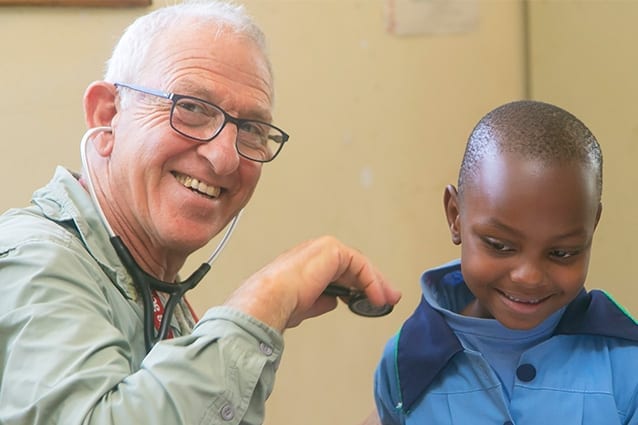
Doctor Philip, a general practitioner from Armidale, New South Wales, returned with the Health Check team for the second year in a row.
“I’ve been taught from an early age that a healthy mind and healthy body go hand in hand. We’re here to help maximise students’ learning potential by identifying particular health concerns which may impact upon their ability to concentrate or absorb information in class, particularly when it comes to issues with seeing and hearing,” Philip said.
“We also check on students’ psychological wellbeing. Many St Jude’s students come from backgrounds of trauma. I sponsor a student whose mother died from AIDS. She was abandoned by her father when her mother died. These kinds of traumas affect a child’s ability to learn and may manifest through physical symptoms so it’s important we look after their mental health as well.”
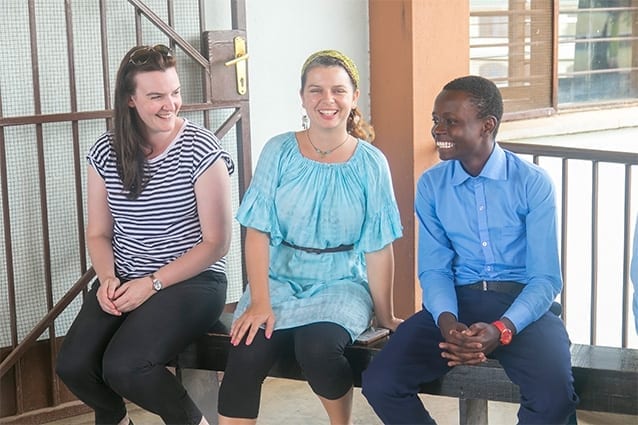
Chloe, an educational psychologist from Victoria and a newcomer to the Health Check team this year, engaged staff members in professional development seminars to help them identify and address mental health issues students may experience.
“In a country like Tanzania, which is doing relatively well compared to some African countries, mental health awareness is still quite limited. However, there seems a desire to learn more about it. There’s a big need for education from a grassroots level. It’s really fertile ground for training and education around how to support mental health issues and how to reduce the stigma.”
“We know that children perform better if they are well-supported and have coping strategies to deal with underlying stresses or traumas. I’ve been so impressed with the Child Protection Officers at the School and the work they’re doing. Providing services for them and building capacity is wonderful. They’re very keen, invested in and passionate about what they do at St Jude’s.”
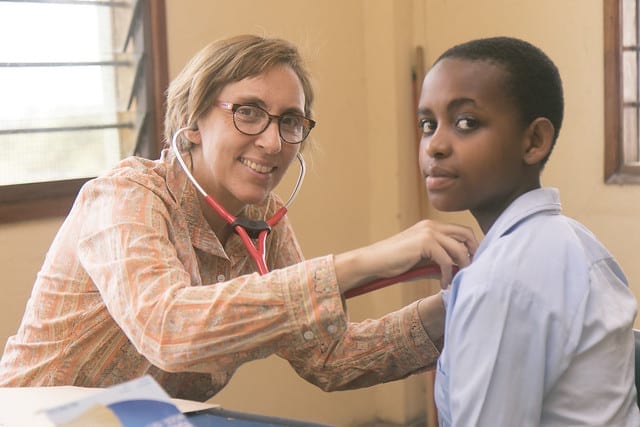
Are you interested in spending time with our students and staff? Visit St Jude’s and join our community! Contact our Visitor team directly at visitor@schoolofstjude.co.tz for more information.
A special thanks to: Doctors Philippa, Craig, Annie, Gordon, Philip, and Sarah. Orthoptists Myra and Caroline. Psychologists Chloe and Camillia. Social worker/counsellors Dan and Janene. Nurse Louise. Audiologist Migien. Physiotherapist Jane. Associates June and Veronica.
Each year on March 8, International Women’s Day is commemorated globally. It presents an opportunity for people to celebrate the contribution females make to society, to stand in solidarity with females in need, and to raise awareness of gender equality issues which inhibit the advancement of women.
The theme for this year’s celebration, declared by the United Nations, was ‘Press For Progress’. St Jude’s students and staff were more than willing to raise the roof with words of wisdom and empowering songs at the inaugural International Women’s Day assembly.
Curated by founding members of St Jude’s new Marketing Club, with the support of Ms Pendo, Assistant Deputy of School Values and Welfare at Smith Secondary Campus, students were encouraged to reflect on inspiring females in their own lives, without whom they could not become strong, moral and intellectual leaders.
Zulfa, a Form 5 student, opened the ceremony with a stirring speech entitled My Voice is my Strength.
“With my voice, I am able to spread the word of equality, justice and liberty. I can decrease the rate of poverty by speaking against violence. I can make those who feel low, stand and rise again. It takes a voice to bring back life in areas where oppression has dominated.”
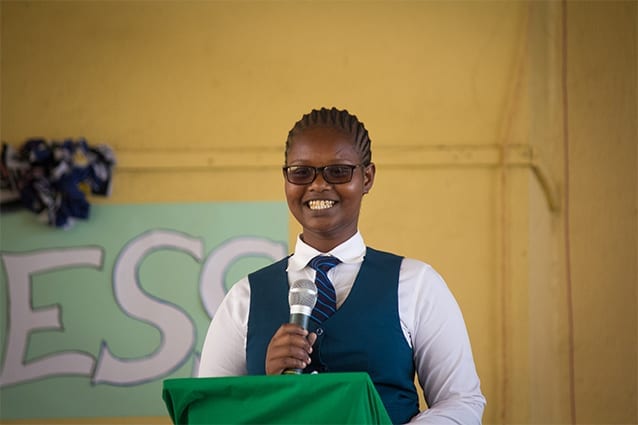
Following Zulfa’s emotive declaration, Yasintha, also in Form 5, took to the podium with a recitation of her original poem, The Conqueror.
“…She rises above her pain, her sorrow, brushes down her worry, gets herself in check, always ready for tomorrow. She is a burning fire. No way is she going to be stifled, left to wither like a rose. They call her ‘Prey’, they call her ‘Nothing’…but I call her ‘The Conqueror’.”
The assembly concluded with a spontaneous eruption of solidarity. Students in Forms 1 and 5 entertained the crowd with songs written by African women. To conclude, they beckoned staff, students and visitors to the stage. More than a hundred people jumped to their feet and joined the choir, raising their voices in collective celebration.
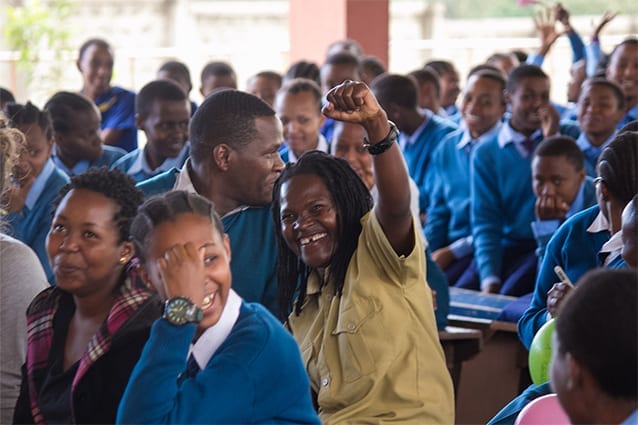
Inspired by the unique event, Mr Emanuel, School Registrar at Smith Secondary Campus, offered an impromptu vote of thanks to students and staff involved with organising the assembly, and some food for thought.
“It is impossible to imagine a world without women. They bring life. To all students, I pose this challenge: what will you do to change this world for the better? How will you make it possible for all females to thrive?”
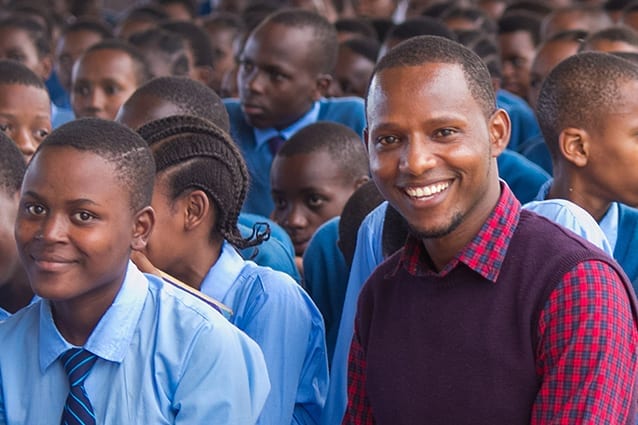
Form 5 student and Marketing Club President, Lina, quoting her role model, Marianne Williamson, had the perfect response.
“’Our deepest fear is not that we are inadequate. Our deepest fear is that we are powerful beyond all measure…we ask ourselves, ‘who am I to be brilliant, gorgeous, talented, fabulous?’ Actually, who are you not to be? Your playing small does not serve the world.’”
You can help our inspiring change-makers reach their highest potential by sponsoring a student today!